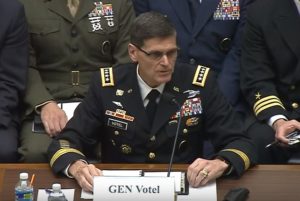by WorldTribune Staff, March 30, 2017
The United States has “not seen any improvement in Iran’s behavior” since the nuclear deal was signed and the Islamic Republic continues to pose the “most significant threat” in the Middle East, the top U.S. military commander in the region told Congress on March 29.
U.S. Central Command leader Gen. Joseph Votel, in testimony to the House Armed Services Committee, warned that, since the nuclear deal, Iran has only increased its support for its proxies such as Hizbullah and the Houthi rebels and for militias in Syria and Iraq while building large numbers of ballistic missiles.

Votel opened his remarks by stating “Iran poses the greatest long-term threat to stability in this part of the world.”
Iran also is seeking to foment unrest in Yemen, Lebanon, and the Gaza Strip and its growing relationship with Russia poses regional concerns, Votel said.
“Iran fosters instability by funding and promoting a threat network that employs provocation, violence, and covert arms transfers that serve as the stimulants for a range of conflicts across the region,” according to Votel.
“It complements this subversive arm with conventional military provocation and overt threats to close key maritime sea lanes, especially at critical international economic chokepoints, namely the Strait of Hormuz and the BAM Strait, which puts global political stability and economic prosperity at risk.”
In addition to Iran’s “nuclear weapons potential,” the country poses several “credible threats,” according to Votel. These include its “robust” ballistic missile program, cyber threats, and the continued harassment of U.S. forces stationed in the region.
Votel also said that President Donald Trump has an opportunity to get tough with Iran as it continues to harass U.S. military assets in the region.
“Through both messaging and actions, we must also be clear in our communications and ensure the credibility of U.S. intentions,” Votel stated in his written testimony. “Iran must believe there will be prohibitive consequences if it chooses to continue its malign activities designed to foment instability in the region.”
While Iranian-backed militias in Iraq have mainly worked to fight ISIS, they could turn their attention to the United States at any time, according to Votel.
“We remain concerned about Iran’s efforts to prop up the Syrian regime against the opposition and its desire to exploit Shia population centers to increase their malign influence, not just in Syria, but also in Arab states across the region,” Votel stated in his testimony.
“We are watching closely for indications and warnings of decreasing Iranian concern regarding the threat posed by ISIS, leading to a potential shift to targeting U.S. and coalition personnel and infrastructure in an effort to influence a potential long-term U.S. security presence,” he said.
